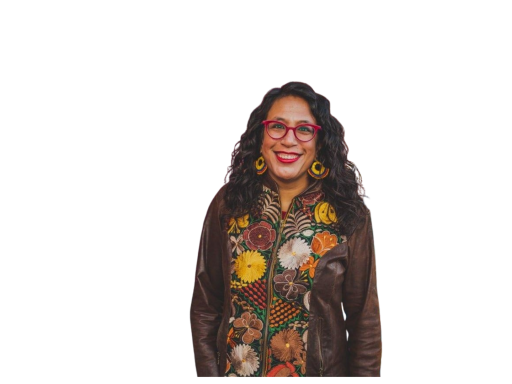CMF COMMUNITY VOICES
CMF Community Voices features a series of conversations and insights from leaders across our community of philanthropy. This curated collection of blogs and Q&As lifts up inspiring voices from changemakers who lead efforts in the areas of Equity, People, Practice and Policy, with equity at the center.
Centering Inclusive Voices
By Erika VanDyke, program officer at the Grand Rapids Community Foundation
Before working in philanthropy and joining the Grand Rapids Community Foundation (GRCF) in 2018, I served as a Kent School Services Network family resource coordinator in an elementary school. My job was to meet the holistic needs of students and families through partnerships with local nonprofits and volunteers, without any sort of budget. I was responsible for knowing the organizations that would be able to help the families I served, requiring me to build a very strong network of groups and individuals that families could trust.
Even before that job, I often found myself in roles where I was bringing people together around a common goal, usually with limited resources. These were the skills that led me to the program officer position at GRCF.
I didn't have a background in philanthropy, so I had a lot of learning to do around the system and was grateful to have access to professional development opportunities and networks like Emerging Practitioners in Philanthropy, Grantmakers for Effective Organizations and CMF, which helped me get plugged into the work.
I started learning about trust-based philanthropy, participatory grantmaking and other progressive ideas in the field, and those are what give me hope for the future of philanthropy.
I also had amazing mentors who supported me in the transition and helped me begin to find my place as a young professional of color in a field that was never set up to center the voices and experiences of people like me, much less the students, families and community members to whom I consider myself accountable.
Being a Latina in philanthropy is complicated because you have to learn the system as you work from within to disrupt it, while trying to ensure that you don’t become too much a part of the system, become complicit or end up compromising yourself and your values.
We know that traditionally, white, wealthy folks are the ones who have had the power and resources to shape how philanthropy works. If we're serious about changing it, we must change who has the power to decide where and how funding should be distributed.
We should trust that those closest to the problems are closest to the solutions, and start not only centering their voices and experiences, but also compensating them for their expertise.
Being a Latina in philanthropy is a tremendous responsibility. I am accountable to my community, and to those who came before me, to leverage the power I have in the spaces of privilege that I occupy, using the platforms to which I have access.
I'll always be incredibly proud of La Lucha Fund, particularly for the degree to which it was led by the community. Held at GRCF, La Lucha Fund was a short-term, emergency COVID response, that provided more than $750,000 in direct cash assistance to 1,200 families who were undocumented or had mixed immigration status in Kent County.
Seven community organizations approached GRCF with the idea of La Lucha Fund — four didn’t have their 501(c)(3) status and six were led by people of color — and all decisions about how the fund functioned were made by their members, including the impacted community.
La Lucha Fund received more than 500 individual gifts from donors both locally and nationally, 80% of whom had never given to GRCF before, reflecting the community's willingness to show up for a funding model that we had never tried before, but that clearly connected with people in a deeply meaningful way. Lucha awards weren't nearly large enough to meet the ongoing needs of undocumented communities in Kent County, and there is still so much work to be done before our neighbors without documentation have equitable access to resources and the comprehensive immigration reform needed to ensure that access, but the fund is certainly a testament to the power of collaboration and relationships in community.
GRCF has made grants to support immigrant communities and continues to have conversations about how to further advance the work of La Lucha Fund. It has also opened conversations about how to better support community organizing and advocacy across the board. We've recently entered that space in the context of education, but I'm hopeful that we'll be able to advance that learning into other areas in the future.
To affect transformative change that truly centers inclusive voices, we have to flip the dynamics that leave community organizations struggling to meet our expectations and start asking ourselves what we need to do to be in right relationships with them so that they want to partner with us.
Systems that were built can be torn down. We can imagine comprehensive immigration reform, abolition, restorative practices, mutual aid and universal healthcare. We can rely not only on hopes and dreams, but on concrete, actionable plans for community change, led by those closest to the pain.
It’s going to take a shift in thinking, and an even bigger shift in power and resources. It’s going to take time — a balance of patience and zeal. Most importantly, it’s going to take all of us being active participants in the work of building more just, equitable and inclusive communities that hold the promise of success for all of our neighbors.
Erika VanDyke is a program officer at the Grand Rapids Community Foundation.
Want more?
Read more about La Lucha Fund.
